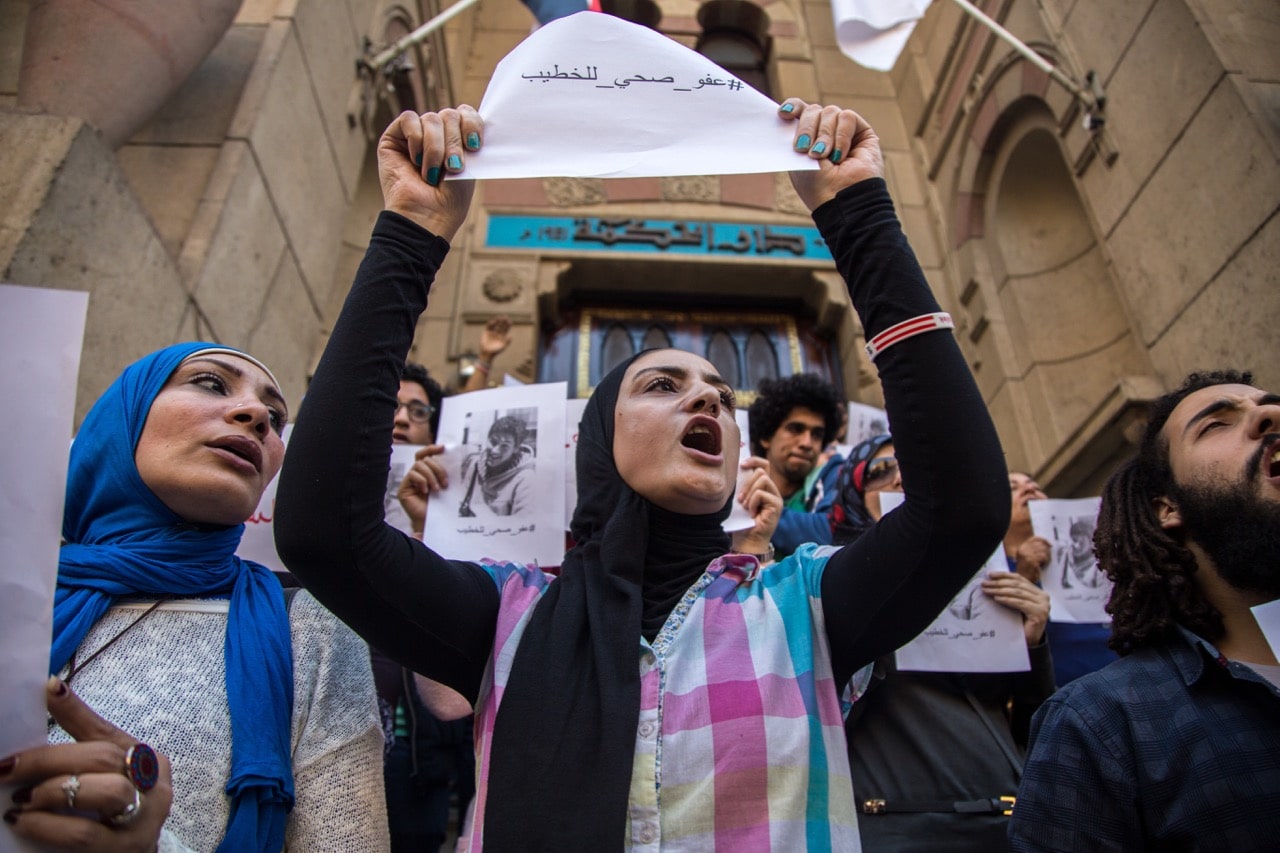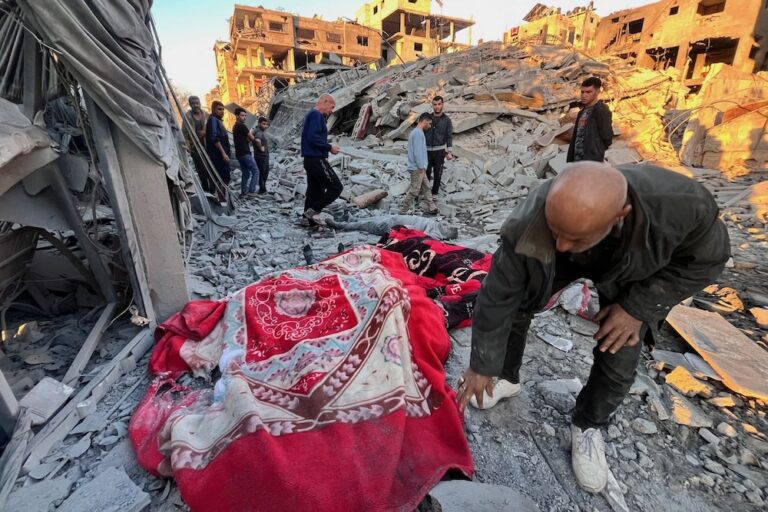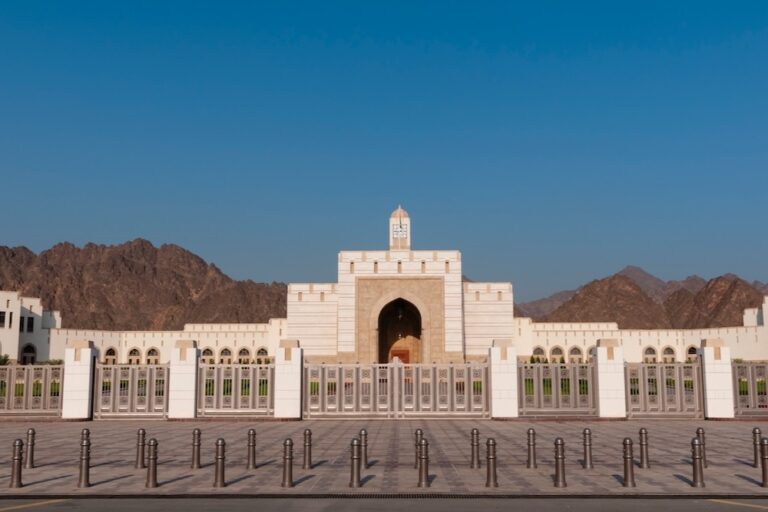In December, MENA activists focused on the plight of political detainees serving lengthy and unjust sentences in obscurity.
Pre-trial detention and lack of due process in Egypt
In Abdel Fattah El- Sisi’s Egypt, dissent, in all its forms, is punished and repressed. Authorities monitor, harass, threaten, arrest, and detain journalists, opposition figures, and activists without regard for the rule of law.
This December, as two Egyptian journalists respectively marked one year and two years in prison without being brought to trial, IFEX members sought to shed light on Egypt’s systematic use of pre-trial detention as yet another form of punishment for political dissent.
On 22 December, Human Rights Watch (HRW) and Reporters Without Borders (RSF) published statements calling for the release of Al Jazeera journalist Mahmoud Hussein. Exactly one year earlier, state security prosecutors arrested Hussein and ordered him detained on charges of “incitement against state institutions”, and “broadcasting false news aimed at spreading chaos”. The judiciary has renewed his provisional detention regularly since his arrest. This month, he marks one year in pre-trial detention without due process, and if the case of fellow journalist Ismail Al Eskandarani is any indication, Hussein could suffer this fate for much longer. Al Eskandarani, a respected journalist and researcher, has languished in an Egyptian jail for more than two years without being brought before a judge. He has surpassed the legal limit for provisional detention in Egypt, yet remains imprisoned without charge.
On 30 December, activist Mahienour Al Masry was sentenced to two years in prison on protest-related charges. On the same day in a separate trial, a court sentenced former Egyptian President Mohamed Morsi and 19 others to three years in prison on charges of insulting the judiciary. Leading Egyptian activist Alaa Abdel Fattah and television presenter Tawfik Okasha, also tried in the same case, were given fines ranging from 30,000 to 1 million Egyptian pounds (US$16,800 – 56,000).
Worsening prison conditions for democracy activists and rights defenders in Bahrain
In Bahrain, thousands of activists, protesters, opposition figures, and journalists suffer in jail for their involvement in a pro-democracy movement that began in 2011. Political detainees have long complained of being denied fair trial guarantees. Allegations of torture have been well-documented by international and local human rights groups alike. This month, rights organisations have rallied around one rising concern: the deteriorating prison conditions political detainees, many of whom are serving outrageously long sentences, are being subjected to.
News of the worsening circumstances in prisons across the island nation was brought to light by human rights defender Abdulhadi Al-Khawaja, serving a life sentence in Bahrain’s notorious Jau prison. Al-Khawaja, along with other prisoners of conscience, have repeatedly protested the arbitrary measures imposed against them in violation of international laws pertaining to the treatment of detainees. Some of those measures include restricting access to television, radio, and books, as well as increased restrictions on already limited contact with family. Health-related complaints by detainees are ignored and medical care is often denied.
Since sending a letter in November to the Ministry of Interior outlining his concerns and those of other prisoners, Al-Khawaja has been facing increased reprisals. The Bahrain Center for Human Rights (BCHR), Americans for Democracy and Human Rights in Bahrain (ADHRB), PEN International, the Gulf Center for Human Rights (GCHR) and the Arabic Network for Human Rights Information (ANHRI) have joined forces in a public statement decrying both the conditions to which prisoners are subjected and the retaliatory measures Al-Khawaja and others have faced as a result of their activism behind bars.
Blocking access to information in Yemen
In Yemen today, as a bloody conflict rages on for a third year, the free flow of information, considered essential for survival in the context of war, famine, and disease, is being obstructed in several ways. Internet disruptions at the hands of the Houthi militias in control of most of Sanaa since 2015 have severely limited civilians’ access to information. In an in-depth piece published on 8 December, the Social Media Exchange (SMEX) team, based in Lebanon, described the many ways Houthi militants sought to limit access to the internet, including slowing down internet speeds and a complete internet shutdown for close to 30 minutes in one particular incident.
The blocking of news sites and social media platforms this month has come amidst renewed physical attacks on journalists and media outlets. On 2 December, Houthi forces fired rocket grenades at the headquarters of the Yemen Al Youm TV station and proceeded to hold 41 journalists hostage. For 12 days, 41 journalists were held inside the TV station’s headquarters without access to the outside world or news on the conditions of their detention. On 14 December, they were released in what RSF has called “unclear circumstances”.
“We are relieved to learn that this TV channel’s journalists and staff are now free but we continue to be concerned about the pressure to which they have been subjected and will no doubt continue to be subjected,” said Alexandra El Khazen, the head of RSF’s Middle East desk.
“Electronic crimes” in Palestine
Following months of campaigning and sustained pressure by local civil society groups in Palestine calling on authorities to repeal a particularly repressive electronic crimes law issued in July, the Justice Ministry has instead proposed to strike some of the more problematic provisions. A joint letter published this month by HRW, 7amleh, Amnesty International, and Avaaz welcomed the proposed amendments but pointed out several other provisions left intact that would allow for “disproportionate and arbitrary restrictions on freedom of expression, privacy, and protection of data.” Palestinian authorities have already charged several journalists as well as human rights defender, Issa Amro, under the law.
In Gaza, where Hamas holds control, online dissenters are often charged with “misusing technology”, according to an amendment to the Penal Code that criminalizes, in vague and overbroad terms, the transfer of pornographic material online, defaming others, and inciting immorality. An article published in Arabic by SMEX this month details how authorities in Gaza have been exploiting this provision to crack down on the expression of opinions they disagree with.
In Brief
In Iran this month, Human Rights Watch shed light on the cases of two prisoners of conscience serving unjust and lengthy sentences. US citizen Xiyue Wang, arrested in 2016 for doing historical research and sentenced to ten years in prison, and Iranian labour activist Reza Shehabi, currently serving six years in prison and suffering from serious medical issues. Shehabi suffered a mini stroke in prison this month and requires urgent medical attention, while Wang has expressed fears for his safety after being threatened by another inmate in the presence of a prison guard.
In Iraq’s Al-Anbar province on 17 December 2017, authorities ordered the independent TV channel AL Sharqiya to shut down its office. The Committee to Protect Journalists (CPJ) and Human Rights Watch condemned the decision in public statements. And in Iraqi Kurdistan this month, the independent television broadcaster Nalia Radio and Television (NRT) was also shut down and its headquarters were vandalized. In the days leading up to it, Kurdish authorities assaulted dozens of journalists as they attempted to report on the anti-austerity protests that swept across the northern region.
In both Lebanon and Israel, protests erupted over Trump’s controversial decision to recognize Jerusalem as the capital of Israel. In Israel, on 15 December, according to a report by PEN International, 15 journalists were severely injured while covering demonstrations. In Lebanon, at a 10 December 2017 demonstration, riot police reacted to stone-throwing indiscriminately and excessively, using water cannons, rubber bullets, teargas, and batons.



